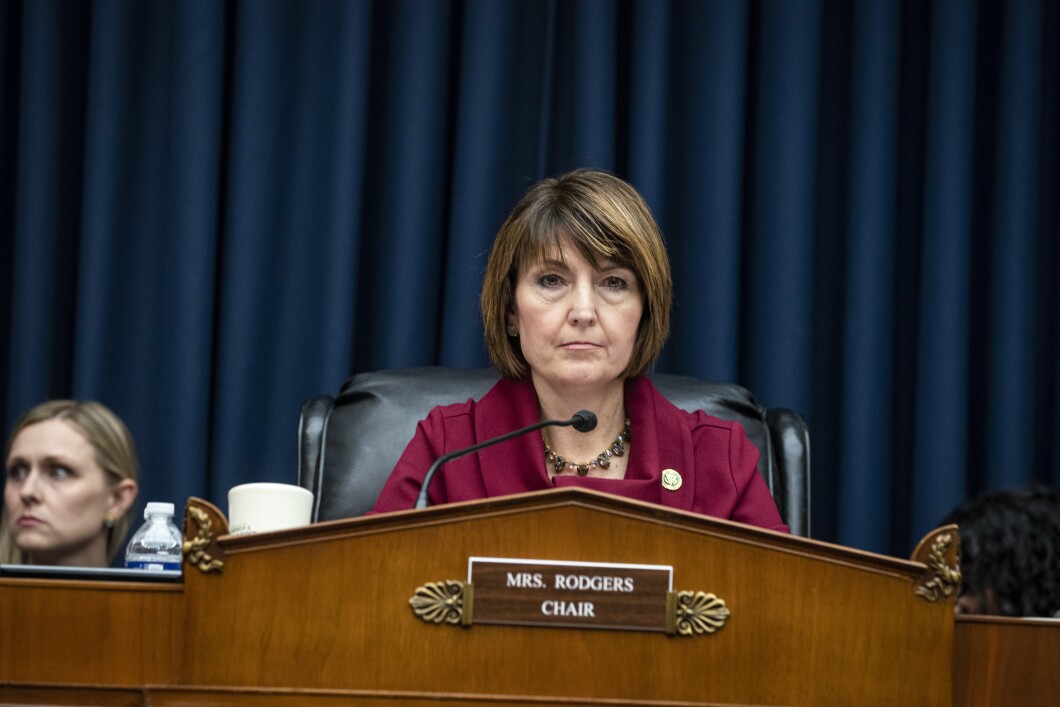
Rep. Cathy McMorris Rodgers, chairwoman of the House Energy and Commerce Committee, one of the most powerful congressional panels, isn’t wasting time moving an agenda focused on an all-of-the-above energy strategy and keeping supply chains open.
The Washington state Republican has carved out an ambitious policy agenda for the 118th legislative session by the Energy and Commerce Committee, which was founded in 1795. Rodgers, who has represented the eastern Washington 5th Congressional District since 2005, is the first female chair of the Energy and Commerce Committee. The panel has wide-ranging jurisdiction over energy policy and environmental quality, along with telecommunications, consumer protection, food and drug safety, public health and research, and interstate and foreign commerce, among others.
She’s already introduced two separate bills aimed at protecting the U.S. emergency crude oil stockpile, both from further presidential drawdowns and being sold to China. Rodgers also has outlined policy priorities ranging from the protection of U.S. critical infrastructure to greenlighting more pipeline projects, accelerating the federal permitting process, and modernizing U.S. energy infrastructure, among other things.
And at a time when issues of energy security and domestic production dominate political discourse and play a key role in the geopolitical landscape, Republicans say they are uniquely positioned to take action on these issues. House Republicans, holding a narrow 222-213 edge over Democrats, are advancing what they see as pro-growth energy policies and working to strip away burdensome regulations that, in their eyes, unduly hamper American competition and economic growth.
Rodgers follows an illustrious list of Energy and Commerce Committee chairmen. The last two times Republicans held the House majority (1995-2007 and 2011-2019), GOP Energy and Commerce Committee chairmen were all serious policy wonks who commanded respect across the aisle, even if Democrats often vehemently disagreed with their policy proposals — former Reps. Joe Barton (TX), Thomas Bliley (VA), Billy Tauzin (LA), Fred Upton (MI), and Greg Walden (OR). Democratic “Old Bull” chairmen include the late Rep. John Dingell (D-MI) and retired Rep. Henry Waxman (D-CA). Rep. Frank Pallone (D-NJ), who was chairman from 2019-23, is now the Energy and Commerce Committee ranking member.
Rodgers was previously a member of the House GOP leadership. She was chairwoman of the House Republican Conference from 2013-19 and vice chairwoman for four years previously. Rodgers was a member of the state House of Representatives in Washington for more than 10 years. Rodgers earned an MBA from the University of Washington, bringing a business eye to policymaking in the vein of House Speaker Kevin McCarthy (R-CA), who has an MBA from Cal State Bakersfield.
With Rodgers at the helm, the committee is “uniquely poised to advance pro-growth energy policies,” said Rep. Bob Latta, an Ohio Republican and senior member of the panel.

That includes increasing the resiliency of the U.S. power grid, cutting red tape, reforming the permitting process, “and making significant investments in vital forms of domestic energy,” Latta told the Washington Examiner.
Here’s an early look at the policies and priorities Rodgers plans to pursue in the 118th Congress as chairwoman of the House Energy and Commerce Committee.
Protecting the U.S. emergency oil stockpile
Rodgers has introduced two bills aimed at protecting the Strategic Petroleum Reserve, or SPR. The proposals seek to prevent the SPR’s barrels from being sold to U.S. adversaries abroad and to protect against what Republicans see as politically motivated drawdowns from President Joe Biden’s administration.
Since November 2021, Biden has ordered the sale of more than 250 million barrels of oil from the crude stockpile. That’s sent price levels plummeting to a more than 40-year low and prompted new concerns about the physical integrity of the underground salt caverns, which can be damaged by repeated withdrawals.
The first bill, which cleared the House in January by a 331-97 vote, would prohibit all direct or indirect SPR sales to China. The second bill, which has yet to come up for a full House vote, would limit the president’s authority to sell more oil from the reserves except in cases of “severe supply disruption,” such as a hurricane or natural disaster. The sales would also be contingent upon the president opening up more federal lands to oil and gas drilling at the same time.
The Biden administration has vowed to veto that bill on the unlikely chance it clears the Senate, which has a 51-49 Democratic majority. And Energy Secretary Jennifer Granholm warned Republicans in a letter that the bill, if passed, would undermine national security and increase fuel costs for consumers.
Still, Rodgers and other Republicans on the panel have been outspoken in their criticism of Biden’s SPR sales, viewing them as a politically motivated effort to lower gas prices ahead of the 2022 midterm elections rather than a tool to help offset supply disruption caused by Russia’s war in Ukraine. Rodgers has also cited concerns about the physical integrity of the underground salt caverns that comprise the SPR, which can be damaged by frequent, repeated drawdowns.
In January, Rodgers and Sen. John Barrasso (R-WY), the top Republican on the Senate Energy and Natural Resources Committee, asked the Department of Energy for information about the physical status of the caverns, as well as information on any planned maintenance projects or repairs.
Rodgers also said she plans to use her leadership post to conduct more oversight into the current administration, including summoning Biden officials to testify before the committee. That will be a shift from the first two years of the Biden administration, Latta said, when Granholm was asked to appear before the committee just two times.
Expect that to change in the months ahead.
“We are very concerned about the regulatory regime and the record number of regulations that are coming out of these agencies,” Rodgers told the Washington Examiner in January.
“We’re going to be doing work on oversight to hold [the administration] accountable — to understand and to make sure that they’re operating within the authority of the law,” she added.
Permitting reform
Rodgers and other Republicans are expected to prioritize energy permitting reform and pass legislation expediting the National Environmental Policy Act, or NEPA, review process.
Here, they could see some bipartisan support, including from Sen. Joe Manchin (D-WV), whose various attempts to pass permitting reform failed during the last Congress, including after he reintroduced it as an amendment to the National Defense Authorization Act in December.
Senate Majority Leader Chuck Schumer (D-NY) agreed to support permitting reform last August in exchange for Manchin’s “yes” vote on the Inflation Reduction Act, which includes $369 billion in climate and clean energy spending.
Manchin’s proposed legislation would have given states one year to act on permitting before the Federal Energy Regulatory Commission could intervene on interstate transmission projects deemed by the secretary of energy to be of “national interest.”
It is unclear whether Rodgers and House Republicans plan to work with Manchin on any permitting reform efforts, and neither office responded to the Washington Examiner’s request for comment.
Still, leaders in both chambers have criticized the lengthy NEPA review process, which, on average, takes 4 1/2 years to complete.
Rodgers praised Manchin’s push for permitting reform at a January event hosted by the American Petroleum Institute, telling CEO Mike Sommers she sees room for bipartisanship on the issue.
Rodgers did note some disparity between the permitting push backed by Sens. Manchin and Schumer, which focused more on getting wind and solar to the coast, and the priorities of the GOP-led committee, which include lowering costs of permitting and maintaining local input in the decisions. But the chairwoman said she views their efforts last year as a step in the right direction.
“The first step is to recognize that we need to address permitting in the United States of America,” she said. “It is, as I said, the No. 1 barrier to doing anything, and we can do better.”
According to a report released this month from the American Petroleum Institute, limiting the NEPA review process to two years could spur an additional $67 billion in U.S. energy investment.
GOP Rep. Kelly Armstrong, whose home state of North Dakota is the third-largest crude producer in the U.S. and boasts both abundant fossil fuels and renewable energy resources, told the Washington Examiner that having Republicans in the majority offers them a new opportunity to act on passing permitting reform legislation after years of frustrating fits and starts.
“We need to roll back government overreach that makes it nearly impossible to build the infrastructure we need,” Armstrong, the committee’s new vice chairman, said in an email. “Permitting reform is a great place to start.”
BIDEN DEDICATES $1.2 BILLION IN NEW FUNDS TO AGING AND CLOSED NUCLEAR PLANTS
Fossil fuels
Rodgers has signaled support for friendlier policies on fossil fuels, including authorizing more pipeline projects, such as the Keystone XL pipeline, as “critical to the national interest.”
Latta, the Ohio Republican, has echoed this view, telling reporters last fall he’d like to see the GOP-led committee “go right back after” seeking approval for the Keystone XL pipeline this year.
In his first two years in office, Biden has taken action to “stifle” American energy production, Latta said. That includes canceling the Keystone XL pipeline, stalling the LNG export facility permit, and issuing regulations that make it harder to invest in oil and gas projects.
“To lower costs and establish U.S. energy independence, we should invest in an energy strategy that doesn’t pick winners or losers,” Latta added.
This includes greenlighting new pipeline and energy infrastructure projects and making “significant investments” in vital forms of domestic energy to boost production and U.S. competitiveness. All of which will be top of mind for Republicans in the months ahead.
CLICK HERE TO READ MORE FROM THE WASHINGTON EXAMINER
Bigger picture
Rodgers said the committee is already working on a “package of bills” to “secure American energy” — though she stopped short of offering more specifics.
“There’s a lot in these packages, but I would say it’s focusing on securing American resources, it is on permitting reform, it is on modernizing American energy infrastructure, [and] LNG exports,” Rodgers told Sommers, API CEO, at the group’s January event.
“We need to be promoting carbon capture and sequestration, promoting renewables, promoting nuclear power. America needs to lead on next-generation nuclear energy,” she added.






